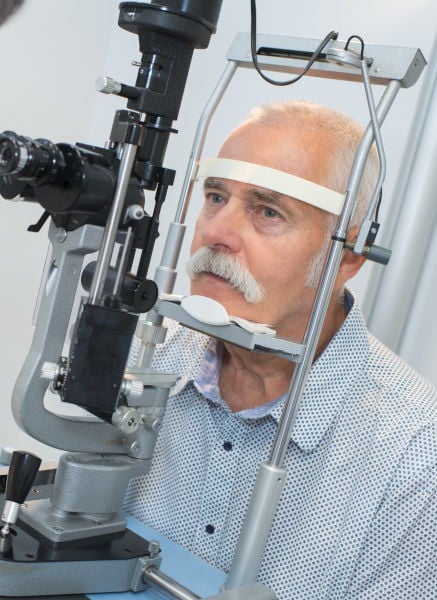Of all age-related vision problems, cataracts are among the most common: by the time you hit 80, chances are you will have developed cataracts — or maybe even had corrective surgery already.
Cataract surgery is a fairly simple procedure, and as a general rule, the earlier you tackle it, the better your chance of success. With that said, cataracts often advance slowly — and during their early stages, they may cause very little disruption. In these cases, busy schedules, fear of needles, or other healthcare problems make it easy to hit the “snooze button” and postpone surgery.
But is this true? Can you really postpone cataract surgery until the next month, semester, or year? And how long can you put this off without creating further problems?

What are cataracts?
Cataracts are a remarkably common eye disease. They occur when a section of your eye’s lens gets progressively clouded. Often, this can be spotted from the outside: the iris (the colored part of your eyes) may begin to appear lighter or have a “milky” section.
Depending on the stage, cataracts usually begin by causing faded colors, halos around bright lights, and blurry or double vision. As they progress, you can expect:
- Loss of night vision (nyctalopia).
- Trouble recognizing faces.
- White blind spots.
- Severe visual impairment.
- Blindness or near-total vision loss.
Cataracts can happen on just one or both of your eyes at a time — but even when they affect both eyes, they are rarely symmetrical.
What causes cataracts?
Most cases of cataracts occur simply due to ageing: the proteins that make up the natural lens of the eye — which covers the retina and reflects light — get damaged over time. This is more likely to happen if you have been chronically exposed to bright sunshine or snowy landscapes, if you have diabetes or hypertension, or if you smoke. All of these things cause cumulative damage — so while they can make cataracts appear sooner or grow faster, daily changes will be almost impossible to spot.
In rare cases, trauma around the eye sockets can cause cataracts to develop quickly; this may cause swelling in the area and leave behind a “cloudy scar” as the swelling goes down. Cataracts can also occur if you are exposed to radiation, or in babies, due to congenital diseases like rubella.
When left untreated, age-related cataracts will always get worse. Fortunately, the treatment is simple — a quick eye surgery.
How does cataract surgery work?
For ophthalmologists, cataract surgery is the “bread and butter” of our hospital practice. According to the American Academy of Ophthalmology, in the U.S. alone, we do about 2 million cataract surgeries every year.

But just because they’re routine for us doesn’t mean all patients are thrilled to have them right away. After all, the idea of any pointy objects near our eyes is enough to make most people blink.
So, what happens when you have cataract surgery? First, don’t expect a hospital stay: this outpatient procedure is usually done in less than half an hour and with local anesthesia only.
Then, we perform two tiny cuts on the sides of the cornea — the transparent layer that covers your eye. These cuts will let us insert a needle, which we will use to aspirate the cortex (the softer outer layer of the cataract).
Sometimes, we will use a laser or a small ultrasonic device to help loosen the cataract. At the same time, we will inject a small amount of saline to ensure the eye volume stays the same. Finally, we will insert a small plastic intraocular lens (IOL) to replace the original, clouded lens.
Cataract surgery side effects and recovery time
As intimidating and precise as it all sounds, cataract surgeries are among the safest within ophthalmology.
We’ll send you home the same day, and you will be walking before the next morning. Occasionally, your eyes can itch or feel dry for a couple of days — we’ll give you some eye drops for that. You will need to wear an eye shield to sleep for a few days and sunglasses when out for a few weeks. Most patients can drive, work, and resume their regular activities within ten days.
As for success rates — up to 95% of all patients who have cataract surgery recover clear vision. In some cases, we can even improve your general vision, especially if you had astigmatism or shortsightedness (myopia) but never ventured for LASIK surgery. The artificial lens gives us an opportunity for mild vision correction. Just keep in mind that this part is not guaranteed.
When should I have cataract surgery?
If you’re visiting an eye doctor every year or two, there’s a good chance we will discover your cataracts before they produce any symptoms. This will give you some wiggle time.
For some people, the immediate response is to “get it over with.” Ultimately, cataracts are progressive, and they will not get better without eye surgery. So, why wait for cataract surgery?
Medically speaking, there are not many reasons that require you to postpone surgery — bar an eye infection or very high blood pressure. For people who are otherwise healthy, there’s no advantage in delaying.
What happens if I have glaucoma and cataracts?
If we find you have glaucoma alongside cataracts, we may be able to deal with both eye diseases at the same time. This is a more complex procedure, so in these cases, you’ll have to explore different possibilities with your eye doctor.
Ultimately, most patients postpone cataract surgery simply because it’s not urgent — and most of us need to shuffle our schedules a bit before getting a few days off. The key here is recognizing when you can’t afford to wait anymore.
Signs you shouldn’t delay cataract surgery any longer
The short and simple answer here is: once cataracts begin to affect your quality of life, it’s time to book the surgery. Some signs to look out for include:

The clouding is getting in the way of your job
This usually happens first for people who work night shifts or who enjoy crafty hobbies that require handling little pieces. In these cases, cataracts will quickly get in the way of your daily activities, as we tend to lose our night vision first.
If you work as a driver or frequently commute long distances, also keep in mind that untreated cataracts increase your risk of a car accident.
Your other vision problems are getting worse
Far-sighted and near-sighted people are quick to blame their glasses (or contact lenses) for any blurred vision. However, if you find your new prescription frames are not doing the trick, it may be time to fix your cataracts.
You are tripping or slipping more often
As cataracts progress, so does your risk of falling. With some luck, you’ll find yourself stepping on pens or bumping your toes before a serious fall — and this is a sure sign that cataracts are now urgent.
Looking for Cataract Surgery near LA? Try Assil Gaur Eye Institute!
The team at Assil Gaur Eye Institute includes experienced eye surgeons, nurses, and technicians who are all committed to providing holistic ocular health.
One of our biggest points of pride is our ability to keep up with the latest advances in ophthalmology — be it laser cataract surgery, IOL implants, and retinal detachment repairs. We also provide routine eye exams, and firmly believe in involving family doctors to ensure each patient gets a personalized health care plan.
Please call (866) 945-2745 or make an appointment online.
We are conveniently located for patients throughout Southern California and the Los Angeles area at locations in or near Beverly Hills, Santa Monica, West Los Angeles, West Hollywood, Culver City, Hollywood, Venice, Marina del Rey, Malibu, Manhattan Beach, and Downtown Los Angeles.
- What’s New in Keratoconus Treatment? A 2024 Update - 04/16/2024
- Dr. Assil and His Team Correct the Side Effects of Laser Eye Surgery - 04/03/2024
- What is ocular herpes? - 09/22/2023













